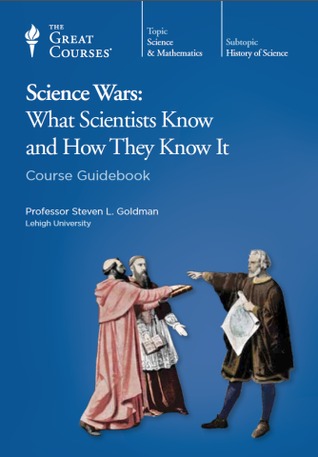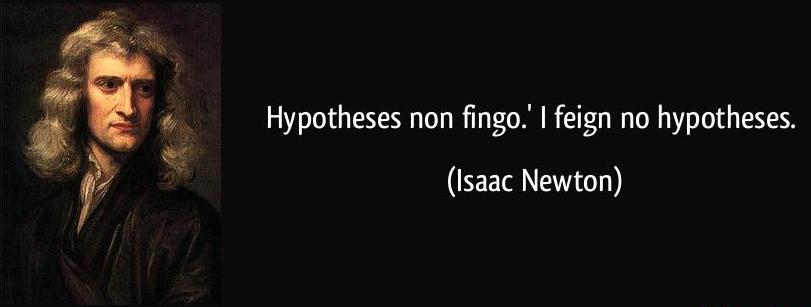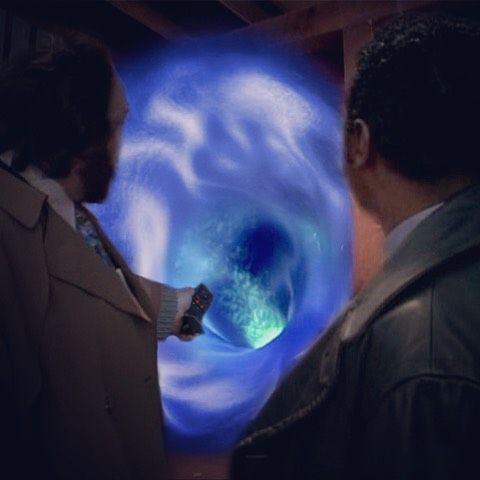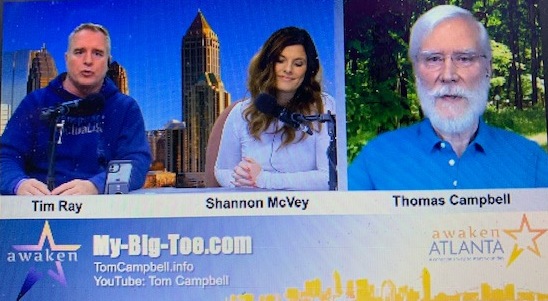|
home | what's new | other sites | contact | about |
|||||||||||||
|
Word Gems exploring self-realization, sacred personhood, and full humanity
Not Enough Time, Part III Parallel Universes, Science in Crisis:
return to "Evolution Controversy" contents page
a 'serious intellectual problem' afflicting modern science Professor Goldman, near the end of lecture two, asserts: “There is a serious intellectual problem [extant today] that Francis Bacon and Rene Descartes were well aware of, and so were Galileo, Newton, and Leibnitz. [The problem arises in the] attempt to argue that a scientific theory is true because it makes correct experimental predictions… There is a [fallacious] form of reasoning [going back to the universities of the Middle Ages and their courses on logic] which is called ‘Affirming the Consequent.’ This is how it works: "Let’s suppose we know that the following sentence is true: If my theory is true, then, as a logical consequence, X should turn red. "Well, [as it happens] X does turn red. Therefore, my theory is true. "This form of reasoning is a deductive logical fallacy – because there could be other reasons why X turns red.
"And if you say, If A is true, then B is also true "And if B, in fact, turns out to be true, this does not tell you that A is true. all of modern science is based upon this flawed experimental method “All of modern science is based upon [flawed] experimental prediction of this sort. So, this means that, built into modern science, is a flaw [of logical procedure, making it prone to error]… There is [in modern science] a kind of fracture zone that precludes certainty. We can never be certain that just because a theory ‘works’ [or gives us a predicted response] that it is true [in a universal sense]. many theories in the history of science 'worked' but they were still very wrong "As we will see in this course of lectures, there were many theories [in the history of science] thought to be correct [as a final answer] because they ‘worked,’ but were subsequently [overturned] and declared to be false. Newtonian mechanics being one example of this [overturning], once we hit relativity theory. swept under the rug "We will talk about this [problem] with respect to Newton and Leibnitz [who were well aware of this pitfall in logical reasoning], but then, [after these two great scientists passed from the scene] this awareness [of the logical fallacy] disappears [in the history of science], as if it could be swept under the rug. a deductively fallacious reasoning, now, under false pretenses, disingenuously taking its honored place as a fundamental feature of modern science "Nevertheless, it is a fact that a deductively fallacious reasoning is a fundamental feature of modern science." Newton condemned this dishonest form of scientific method. He famously said (see above): “I do not feign hypotheses”; in this statement, he was speaking, in good measure, to Descartes, who advocated what would become today’s accepted procedure of “logical fallacy.” Descartes insisted that God could have made the world in an infinite number of ways, but we don’t know what he did exactly, and so if we can find one way that works, we’ll take that way to be the correct way, the way it originally happened - a universal truth. the great contention “Descartes’ method is critically dependent on believing that you can rely on the universal premises you select as basis for your deductions. But where might these universal premises come from? That’s the great contention.” the primary purpose of this article is to expose the error of 'parallel universes' We’ve laid the groundwork for this, and we're getting closer, but allow me to present some of Professor Goldman’s remarks in simpler language. What’s so bad about a deductive premise? In the right context, it has its place: earlier, we mentioned a proper application concerning “following the path of the beautiful” and harnessing the power of intuition leading to a sudden burst of creativity. But even this, what seems to be a deductive method, is squarely built upon induction, on fact gathering. The great scientists who spoke of resonating with the beautiful did a lot of homework before being held in thrall by a sense of the aesthetic. Typically, the great scientists worked for many years gathering evidence, collecting data, before they made their big breakthrough. Their resultant “eternal deductive premise,” did not fall unheralded from the sky, it was coaxed down to earth over time. Newton became an adversary of deduction with his “hypotheses non fingo.” Dr. Goldman, too, put it this way, to the effect: “It seems that Descartes believed that you could just sit around and dream up an eternal premise, a grand hypothesis, [a "law" of science] that seemed to answer what you were looking for.” Descartes distrusted experimentation. He saw it as the problem. He said that the mind is clever enough to see through the illusions created by our faulty five senses. Granted, our senses do deceive us – we discussed this in the “Stars and Midnight Blue” article – nevertheless, truth has a way of manifesting via many experiments, over time, corroborated also by the work of others, which incremental process will affirm the validity of conclusions.
What's so wrong with the naked deductive premise? Francis Bacon is eager to explain it to us. Sir Francis Bacon (1561 - 1626) is considered one of the leading fathers of what would become enlightened science. He spoke out against the sloppy reasoning of a too-easy deductive method (Descartes) and also the superstitious and dogmatic thinking of the RCC, whose authoritarian, doctrinaire ways were prolonging a dark age of ignorance. (You will find more discussion of Bacon in the main article featuring Professor Goldman's work.) Bacon’s 1620 book “New Organon” offered a method for acquiring knowledge Editor's note: The "Organon" (Greek meaning, "instrument, tool") refers to Aristotle's six works on logic. By naming his book “New Organon,” Bacon was saying “I propose a new method, a new way of thinking in terms of acquiring knowledge.” The key to knowledge of nature, Bacon argued, was not genius or devotion to church doctrine but a “mechanical” method that revealed the laws of nature in the gathering of empirical data. Startlingly, Bacon argued that the human mind itself was an obstacle to knowledge of nature – it is the problem, he said, not the solution. Editor’s note: He was on the right track. Today we would say that if one’s thinking is based upon the “false self,” one’s experience will be colored by perceptions of “I am not enough.” Bacon’s famous 'idols of the mind' He identified four “idols” which the unenlightened mind serves; "idols" in the sense of unwarranted worship or deference: idols of the tribe: following peer-group pressure, denying your own judgment idols of the cave: following only self-interest, private concerns, neglecting the greater good idols of the theatre: following the dogmatism of the popular culture, the canned, memorized answers taught in school as "the truth" idols of the marketplace: allowing materialism, consumerism, to direct one's thinking Bacon's "idols" represent four ways in which the mind is misled and subverted. These influences center about family prejudices, base cravings, following gurus, private agendas, unexamined accepted norms, and the like. A strictly controlled, even-handed induction – a rigorous fact-gathering process – Bacon contended, is the solution to the problem of acquiring knowledge of nature. Bacon and Descartes were at far-opposite poles in this debate. Bacon said that the untutored mind is the problem, and Descartes insisted that the mind is the solution. Bacon said that fact-gathering is the answer, but Descartes said that induction cannot be trusted. the idolatries of the mind As we’ve discussed, there is a good place for both induction and deduction in the truth-seeking process. However, in most cases, at least at the beginning of the process, I would have to side with Bacon. The “idols of the mind” are a very big problem. Think of our own world. It's difficult to get a straight answer about anything. Think of the ideas that are being sold in the marketplace. Most of it is rubbish, somebody is trying to sell you something, some Dear Leader is trying to convince you to support a power-agenda. Virtually all of it is some form of “idolatry of the mind.” Unscrupulous people will say anything – even to convince themselves – that black is white, up is down, hot is cold. This unbridled confusion, this naked attempt to redefine and redistill reality, coming to us as a spirit of cultism, invades all facets of society: dirty politics, disingenuous religion, materialistic science, bigoted academia, grasping business – it’s all about “getting your way,” not just at the expense of others, but of truth itself. If A is true, then B is also true Professor Goldman makes a big point of this. He said that just because an idea “works” as predicted doesn’t mean it’s true. There could be many other reasons why it “worked,” and maybe the popular reason isn’t the real reason at all. the sun comes up in the east every morning, it's so obvious that the sun is circling the earth, we can even see it crossing the sky all day long, and we can predict that the sun will rise again in the east tomorrow morning, we’ve never been wrong yet, so we know we're right People believed this for thousands of years. It seemed too clear to doubt, and the Church, too, gave blessing to this precept (and burned at the stake those, like Father Bruno, who taught otherwise). But it was all quite wrong.
every morning the rooster crows at dawn, and the chanticleer is absolutely convinced that his singing makes the sun to rise; there he is, crowing every morning, and then the sun comes up just like clockwork, this is obviously cause-and-effect, case closed This is the problem with the undisciplined deductive method. It's the kind of confusion we lead ourselves into when we offer sacrifice to the “idols of the mind.” Editor's note: Concerning these "idols," it's interesting that the "Course In Miracles," presenting instruction on how to overcome egoic thinking, employs the term "altar" as metaphor of the inner sanctity of the mind. The mind as "altar," however, too often becomes venue of idolatrous worship of the ego. And maybe this will make it a little clearer. shoot the arrow and then paint a bulls-eye around it
It's a perfect shot - every time it's a perfect shot. I'm just that good.
if you go looking for evidence for your idol-of-the-mind hypothesis, I guarantee that you will find it In fact, almost everything coming your way will be deemed as "proof" of what you want to believe. When we crave to surrender our credulity to an object of desire -- the great psychologists call this an "inner slavishness" -- then, true-believers will find supporting evidence under every blade of grass. This is what Maslow with, "When the only tool you have is a hammer, everything will look like a nail."
Sliders
'no evidence' Coming to a knowledge of “parallel universes,” for me, was similar to my initial encounter with the checkered reincarnation theory. Years ago, not having looked into the details of “parallel universes,” I’d assumed there must be something to it. There was so much talk about it, much popular press, even with science documentaries devoted to the concept, so it seemed there had to be scientific support for it somewhere. However, the beginning of the end began when I was listening to a lecture by Dr. Rupert Sheldrake. He said there was "no evidence" for “parallel universes.” I remember being shocked by his statement. How could there be nothing to it with all the fanfare? As I learned more, however, I began to understand that there's much less going on here than meets the eye.
In my article, “Secret Motivations For What We Do,” I feature a quotation from J.P. Morgan: "A man always has two reasons for the things he does - a good one, and the real one." In the following, we will be exploring the evidence, the “two reasons,” for “parallel universes.” Morgan said that one of the reasons will be a “good one,” that is, a plausible one, should anyone question the proposition. In this case, however, it is my opinion that the “good” reason fails this test of plausibility and will be exposed for the effrontery to legitimate science that it is. my observations, assessments, and judgments concerning the veridical nature of 'parallel universes'; subtitled, don't pack your bags and make any reservations quite yet
‘we got it, we got it - we don’t got it’ After doing the internet search, as I surveyed the long list of articles – most of them very supportive of “parallel universes” – some were of recent vintage, while others were written some time ago. But then I noticed something odd. The articles of a few years prior tended to declare victory, to the effect, “We’ve finally got our evidence, parallel universes is now a fact of science!” Well, I guess that settles that. However, moving up the list of articles chronologically, the gushing proclamations of victory fall away to silence, as if the big announcement of yesteryear didn’t happen. But then, the writings of more recent times “throw a big party” all over again with blaring headlines, to the effect, “We finally did it, ‘parallel universes’ now has a sure foundation in science!” And then, once again, other science writers “pop the balloons,” bring it all back down to earth, and offer reasons why this issue is a gross deception. pound the table, make a scene, start shouting This next observation follows closely in goose-step with the former. When you survey the article headlines, you’ll see what I mean: I mentioned the “wild party.” The headlines make you feel like you’ve wandered into a keg beer-bust at a frat house. Not to say, though, if a legitimate discovery in science really had been made, there would be cause for celebration. However, as referenced in other articles on Word Gems, I don’t see intoxicated hubris in the writings of the great scientists after their paradigm-shattering discoveries. Why the low profile from the hallowed ones of science? Every legitimate scientist, well acquainted with the knowledge-production process, is very aware of the great difficulties involved; such that, even when one thinks one is on the right track, and the signs look somewhat promising, much remains to be done in terms of final corroboration and verification. And so, it’s not a slam-dunk, much can go wrong, it’s never a complete vision, there’s always more to come, which inevitably will modify what we see as our best answer today. But I will tell you this: I see no cautioned, thoughtful, and tentative approach reflected in those who promote “parallel universes.” Instead, we feel like its election night, and the losing side, in a brash prevaricating, glassy-eyed way, declares victory even though they lost. On the “Clear Thinking” page, I feature a popular principle of deception: “When the law and the facts do not support your case, then pound the table and vilify the opposing attorney.” Make a scene. Do something sensational to grab media attention. Create a diversion. Maybe you can make something out of nothing, pull a rabbit out of the hat, and convince the unwary by gaudy showmanship, make a big-splash lie, when you have no hope of succeeding on the merits of the case. ‘if A is true, then B is also true’ Jackson Ryan, CNET: “Jumping straight to "parallel universes" is a little over-the-top, and there are less mind-boggling theories that could explain what ANITA (ANtarctic Impulsive Transient Antenna experiment) has detected. "There are a number of potential candidate particles that could account for the results from ANITA," says Geraint Lewis, an astrophysicist at the University of Sydney… “Unfortunately, the majority of reports regurgitating this theory without thorough examination of the evidence complicate the public's relationship with science, which is already on shaky ground thanks to misinformation campaigns around climate change and the coronavirus pandemic. “When you see stories like these its good to remember "the Sagan Standard", an adage uttered by the famed astronomer Carl Sagan. It goes "extraordinary claims require extraordinary evidence." At present, we've got a great theory but we lack the extraordinary evidence to back it up. “What we do have, Ekers (fellow at Australia's National Science Agency) says, is "a somewhat cheeky explanation ... born out of the frustration of having nothing else that worked." He says this is "good out-of-the-box thinking" and a "fascinating" idea but not one that should be taken very seriously. “Gorham (of the University of Hawaii) has requested the New York Post retract their version of the [parallel universes] story, but it remains available. Editor’s note: “a great theory, but we lack the extraordinary evidence.” This is what Newton hated, a theory built in the sky with no supporting inductive evidence as foundation. painting a bulls-eye around the arrow in the wall Jackson Ryan, CNET: Again - “Jumping straight to ‘parallel universes’ is a little over-the-top, and there are less mind-boggling theories that could explain what ANITA (ANtarctic Impulsive Transient Antenna experiment) has detected. ‘There are a number of potential candidate particles that could account for the results from ANITA,’ says Geraint Lewis, an astrophysicist at the University of Sydney…” Ethan Siegel, Forbes: “In all the experiments we've ever performed, all the observations we've ever recorded, and all the measurements ever made, we've never yet discovered an interaction that demands the existence of something beyond our own, isolated Universe to explain… “Every few years, a physicist rediscovers and popularizes the idea that our Big Bang might have... created a counterpart Universe, dominated by antimatter, where many of our conventional rules are flipped. This idea has no evidence behind it and plenty against it, but that rarely gets discussed… “Remember: in science, we must always rule out all the conventional explanations that don't involve new physics before we resort to a game-breaking explanation. Over the past decade, a number of remarkable claims have been made that have disintegrated upon further investigation.” Editor’s note: In other words, the proponents of “parallel universes” want to believe in this. They go well out of their way, denying the methods of legitimate science, to believe in this. Whatever they find, a bulls-eye is drawn around it, victory is declared. Standard good procedure in scientific research is set aside, that of, “ruling out the conventional explanations,” in favor of “jumping straight to ‘parallel universes.” They’re on a hunting expedition, bound and determined to find – not the truth, but – “evidence” for what they crave to discover; and, like the rooster crowing at dawn, they surely will find it. Maslow is vindicated. Occam’s Razor slices up the multiverse Occam’s Razor is a principle of well-constructed economy and parsimony. Any new theory, to be credible, should exhibit a beauty of simplicity, in that, assumptions should be kept to a barest elegant minimum. The theory with the fewest assumptions, the simplest in construction, is most likely to be correct. It needs to offer elegance, symmetry, clarity, brilliance, and harmony. Nothing can be added that doesn’t need to be there. And we use “Occam’s Razor” (William of Ockham, circa 1300 AD) to shave away all unnecessary detail. The theory of “parallel universes” violates the principle of Occam’s Razor to a degree never before seen. And for this reason, among others, it cannot possibly be correct. However, Occam’s Razor, itself, is a theory, and why should we put any stock in it? We should do so because, as history’s greatest scientists assert, the entire universe is put together on a basis of simplicity and beauty. It's not just a fly-away opinion. See the next item. What’s 'beauty' got to do with it? Why should Occam’s Razor, a simplicity and beauty of construction, rule our judgments? Because, as per the opinions of some of the world’s greatest scientists – Newton, Einstein, Heisenberg, Schrodinger, Born, Wheeler, Penrose, Dirac, Watson, Bohm, and others – Nature is revealed as simplicity itself, beautiful in essence, once we truly see how things work.
I invite you to study the many quotations from these luminaries of science as they assert the primacy of beauty and simplicity, elemental building blocks, concerning how the universe and reality unveil themselves. For a theory to be true, for it to accurately reflect the essence of reality, it must exhibit elegance, symmetry, clarity, brilliance, and harmony. The theory of “parallel universes” does not do this; in fact, it proceeds in the opposite direction, multiples confusion, to a degree never before entertained. See the next item for its greatest violation in this regard. an assault on 'the Absolute Sovereignty of the Individual' principle In my studies of the afterlife evidence, of natural law, of the true self versus the false, of how life unfolds on the other side, there is a precept which comes up again and again. My friend Adrian Smith called it “the Absolute Sovereignty of the Individual” principle. Much of Word Gems is built around this concept. Few things are more important, or more well established, in spiritual literature and afterlife testimony. The violation of this principle, along with many others, speaks against the authenticity of another ill-founded concept, reincarnation theory. If “R” were true, our essential being would be chopped and diced, reformulated and regurgitated, spread out among countless lives and trips to the Earth. In this we would lose all that we hold most dear in life, "what we stay alive for," reunion with our loved ones – for, who would we be or become after a 1,000 or 100,000 lives? even worse, who would the one you most love become?
Similarly, if “parallel universes” were true, the same sort of violence would be inflicted upon our sacred selves. This is so because, according to the theory, somewhere, out there in the multiverse, would exist an infinite number of identical expressions of you. If this were true, in this confusion of endless multiplicity, there would be no sacred self, no unique individual, in all of Life, who expresses and reflects the mind of God in a particular way. here's the real reason, the 'reason behind the reason,' why some are so rabid to believe in ‘parallel universes’ Let’s remind ourselves of the context of our discussion. I framed this issue as “Not Enough Time, Part III,” concerning the Evolution debate. In the previous articles featuring “Not Enough Time,” Parts I and II, we saw that chance and probability cannot account for the complexity we see around us; that, not even a duration of time equal to trillions and trillions of universes would be enough time to produce the cosmos. This item has not gone unnoticed by materialists. Darwinism, unlike all other major scientific tenets and theories, has no mathematics to back it up. This is more than a little embarrassing for them, and, as some have pointed out, the Darwin Lobby becomes angry and defensive when reminded of this inconvenient fact. What to do? Radical Darwinism, as we’ve noted, is like a cult religion; even other scientists point this out. But it’s also like a deranged political party, trying to save face and remain credible; and if they can’t win an election honestly, by openly discussing the issues, then, in their totalitarian ways, they'll resort to deception, and will even try to change the very process of how the country is run, in order to make room for their malfeasance. Rupert Sheldrake, 2008 interview comment: “These are mainly people who are committed to a kind of militant/atheist worldview. As far as they are concerned, if you allow any psychic phenomena to occur you are leaving a door open a crack and . . . within seconds you could have God back again and, even worse, the Pope. So, I think, for them, it’s almost like a kind of religious struggle. It’s like a crusade.”
And so, how will they rebut the charge of “the mathematics of probability disembowels your theory”? This is what they’re trying to do: the Goldilocks universe “You say that even trillions and trillions of universes is not enough time to produce even a simple protein? – well then, let’s up the ante and declare that reality itself is made up of – not trillions and trillions of universes, because that wouldn’t be enough time to save our theory, but – an infinite number of universes. Because if, as we assert, somewhere out there, everything that might exist, somewhere, does exist, then, we don’t need chance and probability anymore to rescue us, all we need do is simply declare that our universe just happens to be that one "Goldilocks" universe, a universe wherein everything is "just right," that one amenable universe, among an infinite panoply, which allowed life to evolve as it did." Some of those who make a big deal about neutrinos “dancing backwards” could be motivated by a desire for fame within the scientific world. It’s pretty heady stuff to have your name, for all time, attached to an important discovery. And some might want the money that would ensue – there would be the book deals, the speaking engagements, the commercial endorsements, the movie rights, the pilgrimages to Oprah -- billions are at stake. But the motivations of some are more complicated and speak to existential issues; further, they themselves might not even know why they want “parallel universes” so much. I suggest you glance at the article, among the “Evolution” roster, concerning how the fear of death enters the debate. This is the bedrock reason, the reason behind the reason.
Editor’s note: I’m an admirer of the writings, “The Risen” books, by New York licensed psychotherapist August Goforth. He's also an afterlife-researcher and receives messages from his good friend Tim on the other side. Recently I'd been discussing with August a statement by Tim quoted in "The Risen," which I'd referenced on the "Reincarnation" homepage: “because this one life is eternal, it will always be more than enough” I love this assertion by Tim as it sets the error of "multiple lives" within a clear perspective of endless eternity. August said that this statement is "the summation of Tim's three suggestions: ~ I ~ One’s reality is defined by three I’s ~ Individuality, Intensity, and Infinity. ~ II ~ Only one individual can claim that individual’s life experience. ~ III ~ When Original Creator Source gifts us with individuality, It always gets it entirely right the first time.
August also added: “Chapter 25 [of "the Risen"], "The Pastime of Reincarnation," also mainly by Tim, is one of my favorites.” The error of reincarnational doctrine becomes close-sister to the error of multiple universes. Each of these devalues the sanctity of one’s unique individuality. Notice how Tim emphasizes this one-of-a kind gift in his “three I’s.”
|
|||||||||||||
|
|










